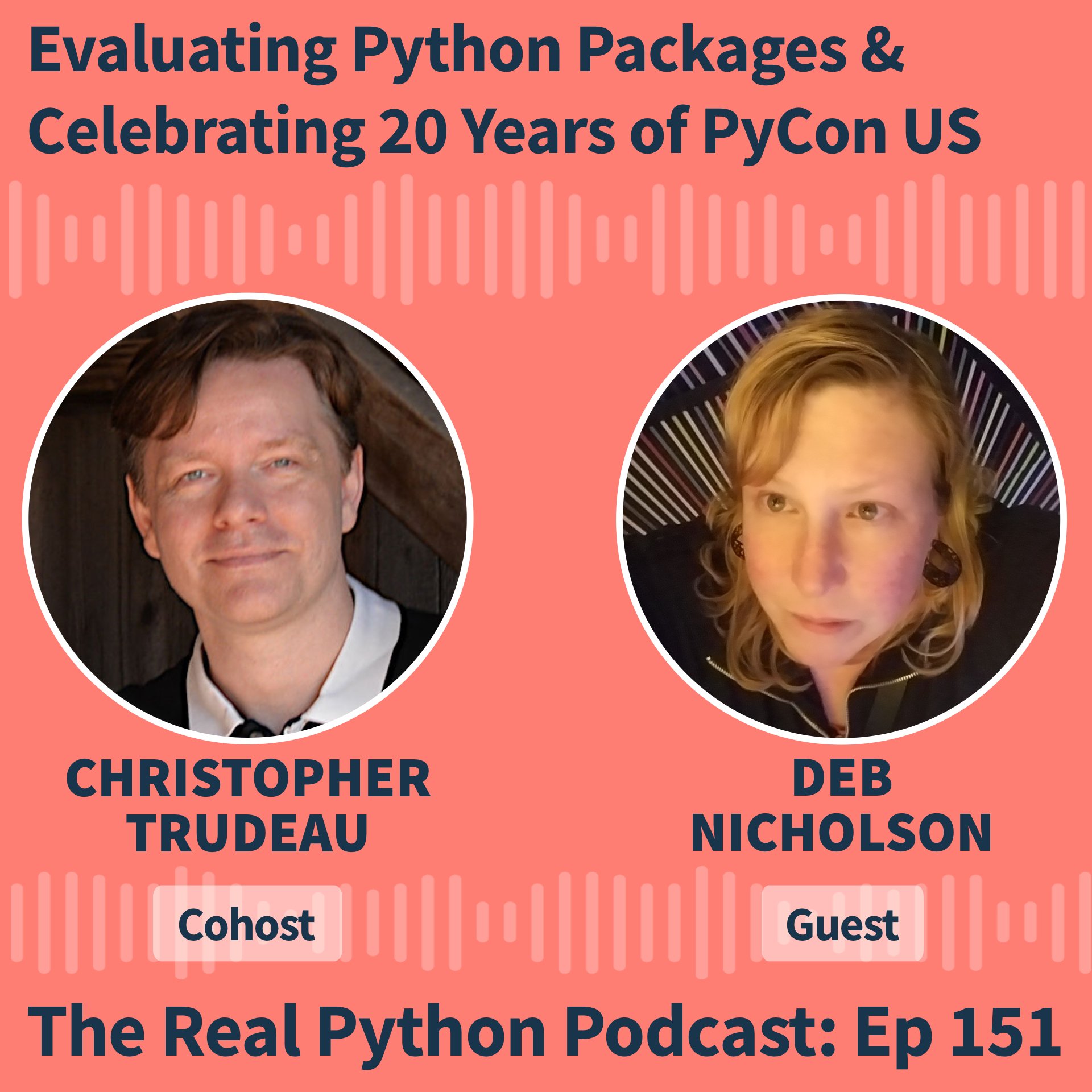Have you ever installed a Python package without knowing anything about it? What best practices should you employ to ensure the quality of your next package installation? Christopher Trudeau is back this week, bringing another batch of PyCoder’s Weekly articles and projects. We also have Python Software Foundation executive director, Deb Nicholson, to share details about PyCon US 2023.
We cover a recent Real Python tutorial by Philipp Acsany on evaluating the quality of Python packages. The piece provides a tool kit for researching the traits, history, software license, and current condition of external Python packages. We also discuss the techniques that we personally use before selecting a package for our Python projects.
We share several other articles and projects from the Python community, with topics such as the underlying structure of virtual environments, the overhead of Python asyncio tasks, documentation for Python projects with Sphinx and Read the Docs, a project for creating argparse boilerplate, and a way to generate seemingly realistic fake numbers using Benford’s law.
Deb Nicholson is also here to talk about the 20th anniversary of PyCon US, hosted in Salt Lake City. We dig into the details of the upcoming conference, including keynote speakers, tutorials, scheduled talks, and improvements to the hybrid online experience.
Course Spotlight: Documenting Python Projects With Sphinx and Read the Docs
In this video series, you’ll create project documentation from scratch using Sphinx, the de facto standard for Python. You’ll also hook your code repository up to Read The Docs to automatically build and publish your code documentation.
Topics:
- 00:00:00 – Introduction
- 00:02:46 – How to Evaluate the Quality of Python Packages
- 00:11:35 – Overhead of Python
asyncioTasks - 00:14:53 – Sponsor: Courier
- 00:15:37 – How Virtual Environments Work
- 00:23:48 – Documenting Python Projects With Sphinx and Read the Docs
- 00:28:29 – duckargs: Code Generator for
argparseBoilerplate - 00:30:46 – Video Course Spotlight
- 00:32:04 – Are Those Numbers Realistic or Fake? Try Using Benford’s Law
- 00:34:37 – Introduction for Deb Nicholson
- 00:36:33 – What is your role with PyCon US?
- 00:37:28 – Hybrid conference and dates
- 00:39:07 – Tutorials
- 00:40:30 – Education Summit and Typing Summit
- 00:42:06 – Keynote speakers
- 00:42:57 – Lightning talks, posters, and job fair
- 00:45:04 – 20th anniversary of PyCon US
- 00:46:56 – Resources for proposals and talks
- 00:49:22 – Previous podcast guests and talks
- 00:51:26 – Mentored sprints for diverse beginners
- 00:53:12 – PyLadies auction
- 00:54:29 – COVID policy
- 00:56:50 – What are you excited about in the world of Python?
- 00:58:07 – What do you want to learn next?
- 00:59:24 – How to follow the PSF and PyCon US?
- 00:59:55 – Thanks and goodbye
Show Links:
- How to Evaluate the Quality of Python Packages – Just like you shouldn’t download any file from the Internet, you shouldn’t install third-party Python packages without evaluating them first. This tutorial will give you the tool set to evaluate the quality of external Python packages before you incorporate them into your Python projects.
- Overhead of Python Asyncio Tasks – The Textual library uses a lot of asyncio tasks. In order to determine whether to spend time optimizing them, Will measured the cost of creating asyncio tasks. TLDR; optimize something else. This article also spawned a conversation on Hacker News.
- How Virtual Environments Work – This article attempts to demystify virtual environments, specifically why they exist and how they work. It even delves into why Brett is heading down this alley and how running into challenges with cross-platform tools has prompted the creation of
microvenv. - Documenting Python Projects With Sphinx and Read the Docs – In this video series, you’ll create project documentation from scratch using Sphinx, the de facto standard for Python. You’ll also hook your code repository up to Read The Docs to automatically build and publish your code documentation.
Projects:
- duckargs: Code Generator for
argparseBoilerplate - Are Those Numbers Realistic or Fake? Try Using Benford’s Law – How can you tell whether a set of figures is trustworthy? It’s not always simple, but Benford’s Law gives you one way to find out. There’s even a Python Package to help you check: randalyze.
PyCon US 2023 Links:
- Welcome to PyCon US 2023
- Python Software Foundation
- Registration Information - PyCon US 2023
- Talks Schedule - PyCon US 2023
- Tutorials Schedule - PyCon US 2023
- Education Summit - PyCon US 2023
- PyCon US Stories Slideshow
- Proposal Guidelines - PyCon US 2023
- PyLadies Auction - PyCon US 2023
- Volunteering - PyCon US 2023
Additional Links:
- Libraries.io - The Open Source Discovery Service
- Licenses - Choose a License
- Python Virtual Environments: A Primer – Real Python
- EU Cyber Resilience Act - Shaping Europe’s digital future
- Python Software Foundation News: Where is the PSF?
- Signup for the Python Software Foundation Newsletter
- The Boston Python User Group (Cambridge, MA) - Meetup
- PyLadies – Women Who Love Coding in Python
Level up your Python skills with our expert-led courses:


 Emissions
Emissions







